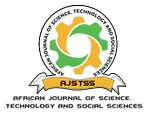Co-treatment of fecal matter with kitchen waste using black soldier fly: process performance evaluation
DOI:
https://doi.org/10.58506/ajstss.v1i1.86Keywords:
Circular economy, co-treatment, fecal matter, Hermetia illucens, sanitationAbstract
Organic matter processing through Hermetia illucens (black soldier fly) technology offers promising fecal sludge management (FSM) and sustainable sanitation option. Fecal matter has been valorized using black soldier fly (BSF) technology; however, there is insufficient knowledge in substrate co-treatment rationing rates to scale up the extant BSFL systems for optimum waste conversion. In this study, an evaluation of BSF process performance during co-treatment of fecal matter and kitchen waste was carried out under laboratory-scale conditions. BSF larvae feeding substrates were formulated using fresh fecal matter and kitchen waste (FM: KW) in the ratios; 1:0, 4:1, 2:1, 1:1, and 0:1. The experiments were set out in rectangular plastic containers (26*13*11cm). Under each mixing ratio, 1000g of the feed substrate was treated utilizing 5g of 5-day old BSF larvae. One hundred larvae were randomly picked at three-day intervals from each treatment (in triplicate) to monitor the larval weight gain across the treatment process. Larval days to 50% pupation, mean pupal yield, waste reduction rate (WR), bioconversion rates (BR), and feed conversion rates (FCR) were monitored for the process performance. The results showed that substrate mixed 1:1 attained the best measures; WR (90.56%), a high weight reduction index (WRI) (5.66), high BR (14.56), and a high overall pre-pupal yield (72.78g) within a shorter development time (16 days). This study affirms the performance efficacy of BSFL to sufficiently convert fecal substrates when co-treated with kitchen waste, promoting a circular economy. It, therefore, illustrates that a co-treatment strategy has the potential to boost and enhance sustainable fecal waste management for future applications.


